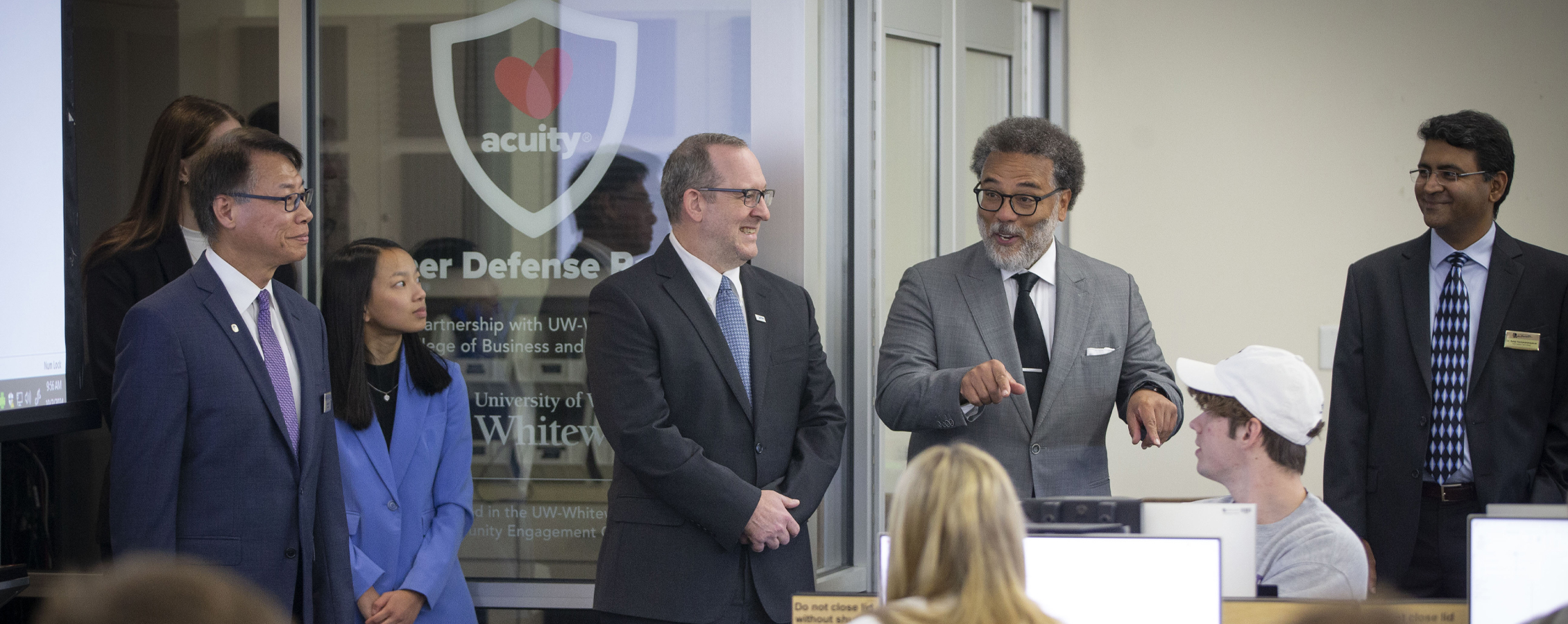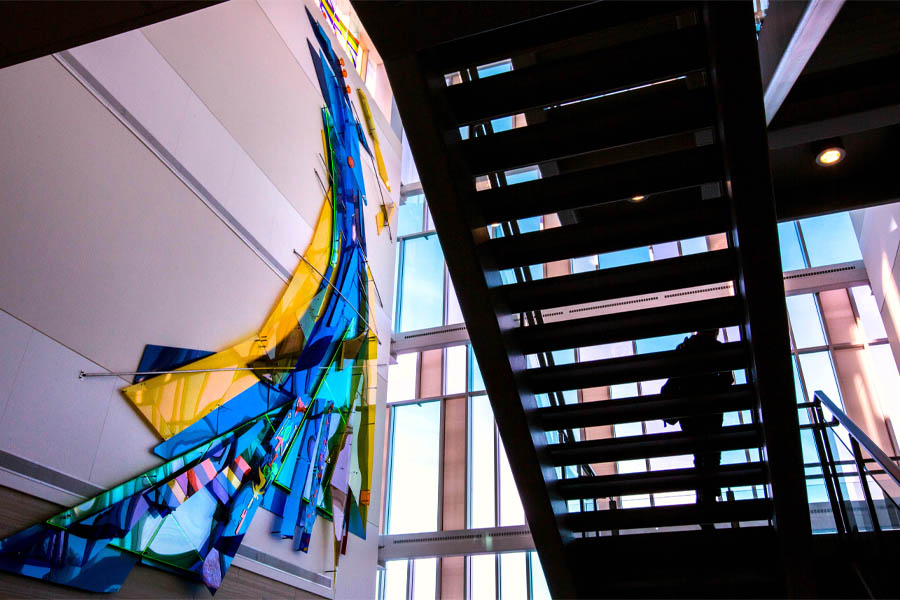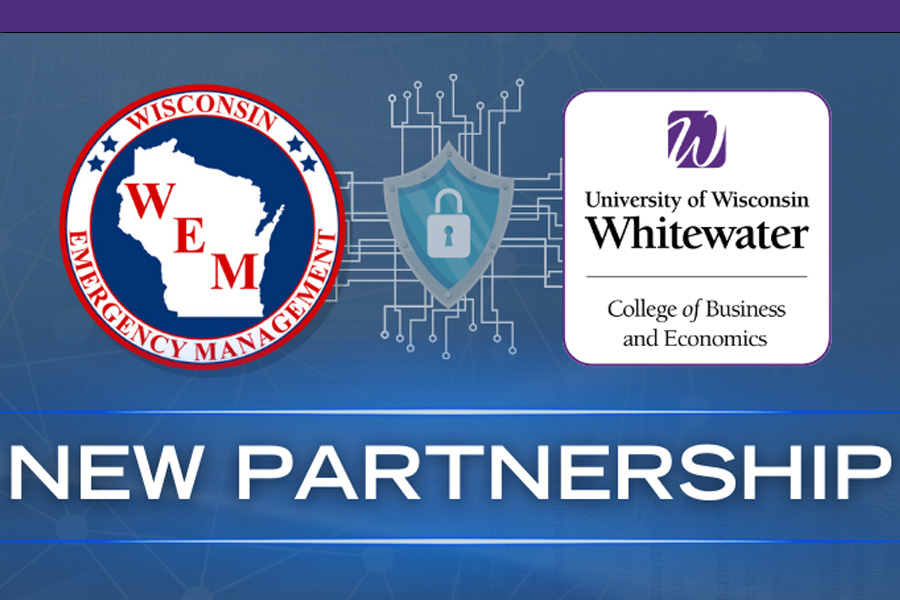White House at UW-Whitewater: National Cyber Director visits campus
October 03, 2024
Written by Chris Lindeke | Photos by Craig Schreiner, Eric Stelter
A growing major at the University of Wisconsin-Whitewater — cybersecurity — was the topic of conversation on the Whitewater campus during a visit from the Office of the National Cyber Director (ONCD) on Wednesday, Oct. 2.
Representatives from the White House, including National Cyber Director Harry Coker, Jr., and Acting Director of the U.S. Office of Personnel Management Rob Shriver, joined UW-Whitewater students, faculty and staff for a day of engagement and learning.
The visit included meetings with campus leadership, a tour of facilities, a student panel, remarks from both White House and university representatives, roundtable discussions, and a visit to UW-Whitewater’s annual Hawk Internship and Career Fair.

From front left, information technology student MayLin Freitag, information technology and marketing student Paige Lenz, cybersecurity alum Mike Rose and cybersecurity student Shamik Patro greet White House National Cyber Director Harry Coker, Jr. Coker and Rob Shriver, acting director of the U.S. Office of Personnel Management, toured technology facilities and classrooms in Hyland Hall in the College of Business and Economics on Wednesday, Oct. 2, 2024. (UW-Whitewater photo/Craig Schreiner)
A student panel discussion included information technology major MayLin Frietag, information technology and marketing major Paige Lenz, and cybersecurity major Shamik Patro. The panel was moderated by Michael Rose, who earned a BBA in information technology and an M.S. in cybersecurity from UW-Whitewater in 2024 and is currently the director of information technology at St. John’s Northwestern Academies in Delafield.
“I didn’t know what cybersecurity was until I joined the cybersecurity club,” said Lenz, a junior from Bloomington, Illinois. “You get to learn theory, get to do hands-on experiences, and get to compete in competitions. It’s helped me a lot with my experiences here.”
Coker lauded the work of UW-Whitewater in the cybersecurity space, especially with small businesses and rural agribusinesses in Wisconsin that are often targets of malware attacks.
“I’ve learned even more about how strong this institution is,” Coker said. “You all ought to be proud of your accomplishments. I’m so proud of what you’re doing and so grateful, particularly to students who I met with this morning. Believe me when I tell you, I’m now even more encouraged about our nation’s future. I’m inspired to be at UW-Whitewater.”
Cybersecurity is one of the fastest-growing occupations in the United States. According to the U.S. Bureau of Labor Statistics, jobs for information security analysts are expected to grow by 33 percent between 2023-33 — the fifth-fastest rate in the nation.
According to Coker, there are nearly 500,000 job openings in cybersecurity in the nation, including 5,000 in Wisconsin. In the southern part of the state alone — including the Janesville, Madison and Milwaukee areas — a total of 3,000 cybersecurity roles are open.

White House National Cyber Director Harry Coker, Jr., center, talks with students after a fireside-chat-style meeting in the Greenhill Center of the Arts on Wednesday, Oct. 2, 2024. (UW-Whitewater photo/Craig Schreiner)
UW-Whitewater is addressing the need head on. The number of degree-seeking cybersecurity majors at the school nearly doubled between the 2022-23 and 2023-24 academic years. The university’s undergraduate major and minor programs related to cybersecurity, combined with the master’s and certificate programs, have risen steadily since 2019-20, including an 11 percent jump between 2022-23 and 2023-24.
UW-Whitewater is aligned with the National Security Agency’s National Centers of Academic Excellence in Cyber Defense (CAE-CD) program and Cyber Operations (CAE-CO) program requirements.
“Cybersecurity is a growing challenge, affecting industries, schools, and businesses of all sizes,” said Jason Janke, dean of the College of Letters and Sciences. “We offer comprehensive undergraduate and graduate cybersecurity programs that are directly aligned with the demands of the workforce.”
UW-Whitewater’s B.S. in cybersecurity, offered through the College of Letters and Sciences, focuses on identifying, preventing, detecting, and responding to security attacks that endanger the safety of property and people.
The university’s BBA in information technology with an emphasis in networking and security, a program in the College of Business and Economics, tackles the same focus areas while exploring the relationship between cybersecurity and business.

Students in an Introduction to Cybersecurity class led by lecturer Mark Dorney fill a classroom in McGraw Hall on Monday, Jan. 29, 2024. (UW-Whitewater photo/Craig Schreiner)
“Cybersecurity is more than just an IT issue — it’s a business imperative,” said Paul Ambrose, dean of the College of Business and Economics. “We are leading the way in ensuring our students have the knowledge and skills to protect organizations from evolving cyber threats.”
Students in both majors engage in the UW-Whitewater Cybersecurity Center for Business (CCB). Housed in the business school, the CCB offers cybersecurity education, research, and outreach for organizations and learners in Wisconsin. Current and past partners include the U.S. Department of Defense and the Wisconsin Emergency Management Cyber Response Team.
“The Cybersecurity Center for Business complements the curriculum initiatives through education, research and outreach initiatives in cybersecurity,” said Balaji Sankaranarayanan, CCB director and professor of information technology and supply chain management.
Graduates can also enroll at UW-Whitewater for additional learning on the topic – other academic programs include an M.S. in cybersecurity, a cybersecurity certificate, and a cybersecurity management certificate. All three programs are fully online, offering convenience and flexibility for professionals to build their skills and enhance their knowledge.

Balaji Sankaranarayanan, Cybersecurity Center for Business director and professor of information technology and supply chain management at UW-Whitewater, speaks to a crowd of students, faculty, staff, community members, and media in attendance during public remarks from UW-Whitewater leaders and White House guests in the Young Auditorium atrium on Oct. 2, 2024. (UW-Whitewater photo/Eric Stelter)
Students in the cybersecurity programs provide free Cyber Preparedness Assessments to rural K-12 school districts and agribusinesses, which are increasingly vulnerable to cyber attacks.
During the upcoming Federal Emergency Management Agency (FEMA) Region 5 Cyber Lucrezia exercise, UW-Whitewater students will shadow professionals in real-time cyber defense.
They’re all part of the hands-on learning that has become commonplace on campus.
“You get classes on the computer science side to learn theory and classes on the IT side where you get hands-on experiences, and the bow on top is the cybersecurity classes,” said Patro, a senior from Verona. “Capstone classes focus on hands-on learning where you go out to local companies and schools and perform actual cybersecurity-related tasks. It’s a phenomenal experience.”
The visit occurred during Cyber Awareness Month, an annual initiative to raise cybersecurity awareness in the United States and around the world.
The day closed at the university’s Hawk Internship and Career Fair, where nearly 200 employers engaged with students and alumni seeking internship and employment opportunities. Approximately 20 of the organizations on hand were recruiting for cybersecurity-related roles.

White House National Cyber Director Harry Coker, Jr., center right, and Rob Shriver, acting director of the U.S. Office of Personnel Management, interact with employers and students at the Hawk Internship and Career Fair in the Kachel Fieldhouse on Wednesday, Oct. 2, 2024. (UW-Whitewater photo/Craig Schreiner)




